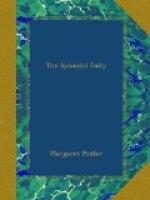Instantly the applause redoubled. People were surging forward towards the platform, pressing round an unfortunate usher who was endeavouring to hand up a sheaf of roses to the singer. Diana bowed, and bowed again. Then she stooped and accepted the roses, and a fresh burst of clapping ensued. A wreath of laurel, and a huge bunch of white heather, for luck, followed the sheaf of roses, and finally, her arms full of flowers, smiling, bowing still, she escaped from the platform.
Back again in the artistes’ room, she found that a number of her friends in front had come round to offer their congratulations. Alan Stair and Joan, Jerry, and Adrienne de Gervais were amongst them, and Diana at once became the centre of a little excited throng, all laughing and talking and shaking her by the hand. Every one seemed to be speaking at once, and behind it all still rose and fell the cannonade of shouts and clapping from the hall.
Four times Diana returned to the platform to acknowledge the tremendous ovation which her singing had called forth, and at length, since Baroni forbade an encore until after her second group of songs, Madame de Louvigny went on to give her solo.
“They weel not want to hear me—after you, Mees Quentin,” she said laughingly.
But the British public is always very faithful to its favourites, and the audience, realising at last that the new singer was not going to bestow an encore, promptly exerted itself to welcome the French pianist in a befitting manner.
When Diana reappeared for her second group of song’s the excitement was intense. Whilst she was singing a pin could have been heard to fall; it almost seemed as though the huge concourse of people held its breath so that not a single note of the wonderful voice should be missed, and when she ceased there fell a silence—that brief silence, like a sigh of ecstasy, which, is the greatest tribute that any artiste can receive.
Then, with a crash like thunder, the applause broke out once more, and presently, reappearing with the sheaf of roses in her hand, Diana sang “The Haven of Memory” as an encore.
Let me remember,
When I am very lonely,
How once your love
But crowned and blessed roe
only,
Long and long
ago.
The plaintive rhythm died away and the clapping which succeeded it was quieter, less boisterous, than hitherto. Some people were crying openly, and many surreptitiously wiped away a tear or so in the intervals of applauding. The audience was shaken by the tender, sorrowful emotion of the song, its big, sentimental British heart throbbing to the haunting quality of the most beautiful voice in Europe.
Diana herself had tears in her eyes. She was experiencing for the first time the passionate exultation born of the knowledge that she could sway the hearts of a multitude by the sheer beauty of her singing—an abiding recompense bestowed for all the sacrifices which art demands from those who learn her secrets.




